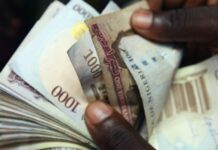By Francis Ogwo
The Central Bank of Nigeria (CBN) has predicted an end to Nigeria’s current recession in the first quarter of 2021 with a 2.0 per cent growth by the end of 2021.
The Governor of CBN, Mr. Godwin Emefiele, made this statement while addressing guests at the 55th Annual Bankers‘ Dinner organized by the Chartered Institute of Bankers of Nigeria (CIBN) in Lagos yesterday.
Emefiele was of the view that the apex bank’s projection for a quick exit from the recession was based on the positive impact of the intervention measures it introduced to tackle the coronavirus pandemic as well as the latest positive Purchasing Managers Index (PMI) report.
In his words: “With sustained implementation of our intervention measures, we do expect that the Nigerian economy could emerge from the recession by the first quarter of 2021. We also expect that growth in 2021 would attain 2.0 per cent.”
He, however, stated that: “Downside risks remain, as restoration of full economic activities, particularly in service related sectors, remains uncertain until a COVID vaccine is produced and made available to millions of people across the world.
“Second, with the significant rise in cases in advanced markets and the imposition of lockdowns in parts of Europe, concerns remain on the impact this could have on growth in advanced economies, commodity prices and the financial markets.”
Emefiele said the risks highlight the need for the country to find ways to insulate the economy from the impact of external shocks through diversification efforts, even as it continues working to ensure that Nigerians adhere to safety protocols in order to prevent a surge in COVID-19 related cases.
The CBN governor, while urging Niigerians to stay positive even in the current recession, said that the nation’s economic managers were confident that the economy will make a swift recovery from the slump as it did from the 2016 recession. He also urged Nigerians not to panic over the external reserves, assuring that at $35billion, the reserves can cover about seven months import of goods and services.
He said “Due to the unprecedented nature of the shock, we continued to favour a gradual liberalization of the foreign exchange market in order to smoothen exchange rate volatility and mitigate the impact which, rapid changes in the exchange rate could have on key macro-economic variables.
“This we believe is in line with international best practices in countries where managed float arrangements are in operation. At the same time, measures are being taken by the Classified as Confidential authorities to improve our non-oil exports and other sources of foreign exchange.
“These measures have helped to prevent a significant decline in our reserves. Our external reserves currently stand above $35 billion and are sufficient to cover 7 months of import of goods and services.”
On inflation, Emefiele said: “Given the fact that the rise in inflation is not due to monetary factors but rather the prevalence of structural rigidities and supply shocks, traditional tools of monetary policy may not be helpful in addressing current inflationary pressures.
“Rather, a more useful policy will be the supplyside measures implemented by the Bank. As a result, emphasis will be placed on strengthening the development finance initiatives of the CBN in order to stimulate greater production and reduce unemployment.”
Specifically, the governor stated that the CBN intends to increase its support for measures that will aid improve cultivation of local produce in the country with particularly emphasis on improving yield levels, given that, “food inflation continues to remain the key driver of inflationary trends.”
Noting that the banking sector has a significant role to play as a facilitator of growth in the agriculture sector, through its intermediation function, the CBN Governor said some of the opportunities in the agriculture sector that lenders should explore include ways to address some of the existing gaps in the agriculture value chains, such as storage centres, transport logistics, and technology forms, that can enable rural farmers to sell their produce directly to the markets.
“These measures would help to improve productivity of farmers, reduce post-harvest losses, increase access to finance for farmers and improve sourcing of local raw materials for processing by manufacturing and industrial firms.
“It will also aid improved production of local goods, enable the creation of jobs, while supporting the growth of other sectors of our economy such as manufacturing, and transportation,” he stated.
The CBN governor further said that the banks should support Information Communication Technology sector as it was enabler for growth in key sectors of the economy.
“While COVID-19 has brought on several challenges to our economy and indeed the banking sector, it offers a unique opportunity for us to build a more resilient economy that is better able to contain external shocks, whilst supporting growth and wealth creation in key sectors of our economy, Emefiele said.
Recall that the World Bank in its Nigeria Development Update in june this year had stated that the collapse in oil prices coupled with the COVID-19 pandemic are basic macroeconomic indices signaling that Nigeria’s economy would plunge into a severe economic recession, the worst since the 1980s.
The report, “Nigeria In Times of COVID-19: Laying Foundations for a Strong Recovery,” estimates that Nigeria’s economy would likely contract by 3.2% in 2020.
This projection assumes that the spread of COVID-19 in Nigeria is contained by the third quarter of 2020. If the spread of the virus becomes more severe, the economy could contract further.











